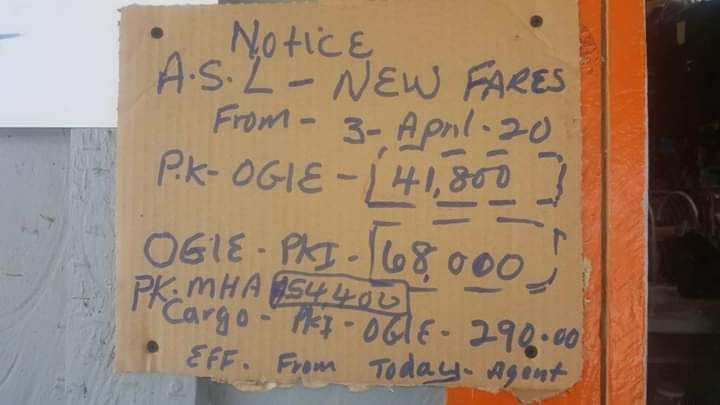Local charter airline Air Services Ltd (ASL) yesterday denied increasing its prices for flights to hinterland regions, while Finance Minister Winston Jordan said the government would be prepared to examine proposals to cap the fares being charged by public transport operators.
Several Indigenous villages have reported that they are experiencing a shortage of food and fuel supplies due to limited transportation options even as some roads and rivers are closed to traffic due to measures taken to limit the spread of the novel coronavirus disease (COVID-19). Many Indigenous communities rely mainly on air and water transportation for delivery of food items and with transportation service providers asked to transport less persons, the cost of freight has reportedly doubled further impacting supplies.
Stabroek News was told on Friday that Air Services Limited, which operates three weekly flights to Paramakatoi, Region Eight, had increased its prices, with the freight price moving from $130 to $290/pound and return airfare from $33,000 per person to $68,000. A sign was posted to this effect at the ASL agent’s office at Paramakatoi earlier this month.
However, ASL yesterday acknowledged reports in the media that the prices for its weekly scheduled flight services to Region Seven and Region Eight have increased and it said they were not true.
“In fact, to assist our customers in Regions 7 and 8 during this time of crisis, ASL has waived all passengers’ cancellation and date change fees. It has increased the allowable free baggage weight for all passengers traveling on the scheduled regional flights. Even though VAT was temporarily removed from all domestic air transport by [the Guyana Revenue Authority] for the next three months, this has no impact on prices to the majority of hinterland communities because those locations were already exempted from VAT [Value Added Tax],” it said in a statement.
“There has been no increase in charter prices, but only reduction,” it further stated, while noting that the number of passengers allowed aboard aircraft is now restricted to 50% of the carrying capacity as part of emergency measures for public transport operators due to COVID-19. It also noted that due to the closures of locations considered to be border locations to passengers’ movement, the scheduled regional ticket prices for Region Seven and Region Eight along with intra-regional ticket prices were adjusted. “Some charters and shuttle prices have been substantially reduced, while the price per pound for freight on regional flights from Georgetown remains unchanged,” it explained.
According to ASL, as a business at the forefront of industries that are most economically affected by the pandemic, it is committed to continue operating safely and sustainably. “For over the last five decades, ASL has been faithfully serving our indigenous communities all across Guyana. We understand that our services are not only inextricably linked to the development of the hinterland, but is the lifeblood to those communities,” it said. “ASL takes its responsibility seriously and it has been engaging the Authorities and all other stakeholders on implementing measures that would least affect our hinterland customers,” it added.
Notwithstanding ASL’s denial, some travelers have said they have paid higher fares and during Friday’s discussion APA Governance and Rights Coordinator Laura George suggested that the cost of the flights be subsidised because of the already high cost of living in indigenous communities. “The cost of basic items is already high and have severely increased now…For example in Region Eight, the North Pakaraimas, and [the] Upper Mazaruni villages in Region Seven were severely impacted by heavy flooding in 2017 and they are still trying to rebound from that. They have been very hard working to get their farms going and things like that but the May/June rains are coming again and they are at risk,” George said, as she explained the plight some villages face.
Meanwhile, in wake of the reported increase in fares by public transport operators, Jordan yesterday told the Department of Public Information (DPI) that the government is prepared “to examine any feasible proposal that would cap the fare and all other benefits accrue to the travelling public.”
A DPI report released yesterday said Jordan noted recently that despite the several measures implemented for operators, many have not seen fit to pass on savings to consumers.
He stated that the government is prepared to sit down with stakeholders and work with them, as far as feasible during this time to bring relief to citizens.
In a recent interview with DPI, the minister reminded of measures implemented by the government to ease the financial burden, due to the COVID-19 Pandemic. These included removal of VAT on local airfares, electricity and reduced fuel prices.






